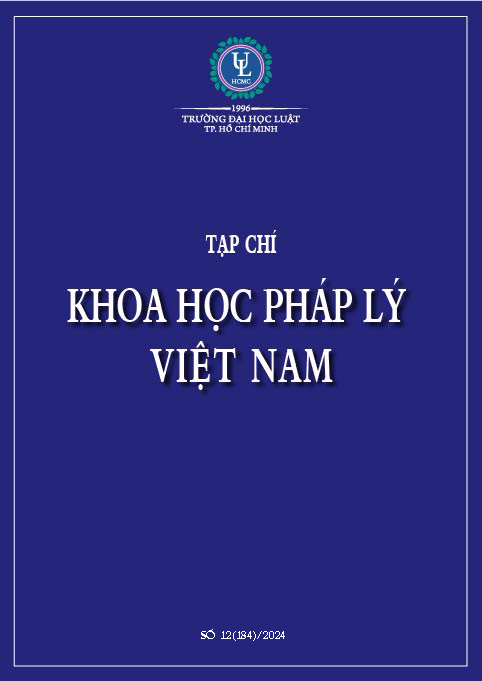Kinh nghiệm của Liên minh châu Âu về hài hòa hóa và nhất thể hóa pháp luật trong việc bảo vệ chủ thể yếu thế khi tham gia hợp đồng trong tư pháp quốc tế - Khuyến nghị cho ASEAN
DOI:
https://doi.org/10.70236/tckhplvn.179Từ khóa:
chủ thể yếu thế, bảo vệ chủ thể yếu thế trong quan hệ hợp đồng có yếu tố nước ngoài, hài hòa hóa và nhất thể hóa pháp luậtTóm tắt
Trong bối cảnh hướng tới xây dựng một thị trường tự do hóa trong nhiều lĩnh vực ở khu vực ASEAN hiện nay, việc có những quy định chung thống nhất về việc bảo vệ chủ thể yếu thế đối với điều khoản chọn luật áp dụng trong các hợp đồng có yếu tố nước ngoài là một điều cần thiết. Xuất phát từ việc EU đã thống nhất và xây dựng khung pháp lý chung thông qua Quy tắc Rome I, bài viết sẽ nghiên cứu về kinh nghiệm của EU trong việc hài hòa hóa, nhất thể hóa về vấn đề này từ khung pháp luật của các nước thành viên EU nhằm đưa ra một số kiến nghị để thúc đẩy việc hài hòa hóa pháp luật giữa các nước thành viên ASEAN.
Tải xuống
Tài liệu tham khảo
[1] Behr Volker, “Rome I Regulation A-Mostly-Unified Private International Law of Contractual Relationships Within-Most-of the European Union”, Journal of Law and Commerce, Vol. 29(2), 2011
[2] Goksor Rasmus, “Jurisprudence on Protection of Weaker Parties in European Contracts Law From a Swedish and Nordic Perspective”, Chicago-Kent Journal of International and Comparative Law, Vol. 6(1), 2006
[3] Kusumadara Afifah, “Pemakaian Hukum Asing Dalam Hukum Perdata Internasional: Kewajiban Dan Pelaksanaannya Di Pengadilan Indonesia” [trans: Afifah Kusumadara, “The Application of Foreign Law in Private International Law: Obligations and Its Implementation in Indonesian Courts”], ARENA HUKUM, Vol. 15, No. 3, 2022
[4] Liukkunen Ulla, “Decent Work and Private International Law”, Decent Work and Private International Law, Vol. 86(4), 2022
[5] Max Planck Institute for Comparative and International Private Law, “Comments on the European Commission’s Proposal for a Regulation of the European Parliament and the Council on the law applicable to contractual obligations (Rome I)”, The Rabel Journal of Comparative and International Private Law, Vol. 71(2), 2007
[6] Nam Phan Hoài, Giải quyết tranh chấp kinh doanh thương mại có yếu tố nước ngoài tại Tòa án Việt Nam – Thẩm quyền và pháp luật áp dụng, Nxb. ĐHQG TP. Hồ Chí Minh, 2021 [trans: Phan Hoai Nam, Resolution of International Business and Commercial Disputes in Vietnamese Courts – Jurisdiction and Applicable Law, Vietnam National University Publishing House, Ho Chi Minh City, 2021]
[7] Rodriguez Claudia F. Peña, Harmonization of EU Contract Law adopted on the basis of Article 114 TFEU, Master’s thesis, Lund University, 2020
[8] Rühl Giesela, “The Protection of Weaker Parties in The Private International Law of The European Union: A Portrait of Inconsistency and Conceptual Truancy”, Journal of Private International Law, 2014, No. 10
[9] Rumi Tiziana & Angelo Viglianisi Ferraro, “Consumer Protection and New Contract Law in the European Union and in Italy”, Journal of Liberty and International Affairs, Vol. 6(1), 2020
[10] Schmitz Benedikt, “Rethinking the Public Interest in Consumer Protection: A Critical Comparative Analysis of Article 6 Rome I Regulation”, European Journal of Comparative Law and Governance, No. 9, 2022
[11] Škarka Adam, Protection of weaker party in the EU case law, Master’s thesis, Masaryk University, 2018
[12] Srikiew Tamawat, “Weaker Party Protection in Private International Law: Thailand, Japan and EU”, EU Studies Diploma Programmes (EU-DPs) Research Paper Cover Sheet, 2017
[13] Yuwadi Sitarat, Conflict of laws in regard to cross-border consumer contracts, Thammasat University, 2022, 2022
[14] Ivana Markovinovic Zunko, “Applicable Law for Consumer Contracts according to the Regulation (EC) No. 593/2008 on the Law Applicable to Contractual Obligations (Rome I)”, 16th International Scientific Conference on Economic and Social Development - The Legal Challenges of Modern World, 2016






